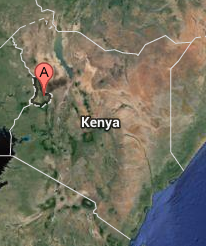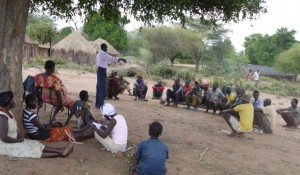 In West Pokot, Kenya, Philipine (Pini) Chepkoech Kidulah and her support staff at Jitokeze Wamama Wafrika are bringing a new element of transformation to the communities through addressing conflict between the Pokot and Turkana people. Jitokeze Wamama Wafrika (Swahili for: “Unveil yourselves, women of Africa”) has been actively engaged in empowering women in the region through agricultural development initiatives and training. As climate change has worsened, resources for both the Turkana and Pokot have been dwindling in this semi-arid climate. With decreased access to resources, these neighboring people groups have turned to cattle rustling (stealing) in order to maintain control over their primary sources of wealth: livestock and land. Many families have lost fathers, brothers, and sons to the violence of the raids. Occasionally unarmed women are even targeted by armed men who seek revenge in the cyclical violence between these two groups of people.
In West Pokot, Kenya, Philipine (Pini) Chepkoech Kidulah and her support staff at Jitokeze Wamama Wafrika are bringing a new element of transformation to the communities through addressing conflict between the Pokot and Turkana people. Jitokeze Wamama Wafrika (Swahili for: “Unveil yourselves, women of Africa”) has been actively engaged in empowering women in the region through agricultural development initiatives and training. As climate change has worsened, resources for both the Turkana and Pokot have been dwindling in this semi-arid climate. With decreased access to resources, these neighboring people groups have turned to cattle rustling (stealing) in order to maintain control over their primary sources of wealth: livestock and land. Many families have lost fathers, brothers, and sons to the violence of the raids. Occasionally unarmed women are even targeted by armed men who seek revenge in the cyclical violence between these two groups of people.
Pini and Jitokeze have recognized that there is a deeper issue than simply limited resources: cattle are valued more than human life. Below is an excerpt from a recent report to Covenant World Relief that details a conflict transformation training session:
There was no lack of response [in discussing the story of Rizpah in 2 Samuel 21, a woman who lost her two sons in politically- and religiously-motivated revenge killings and responds with nonviolent public action], but the esoteric discussion wasn’t getting them anywhere. To bring their discussion to a tangible place, Dan [a missionary who was co-facilitating the training] brought out a chair to represent a hypothetical young man, Ngoroko (“warrior” in Swahili) who had been killed in a cattle-rustling conflict. He asked the group to make up the details about the life of this imaginary young man, to put flesh on his bones, and to speak for the young man, to give voice to the empty chair.
The men spoke for quite a time about how to judge Ngoroko’s actions and about whether or not to exact revenge for his death. The women were encouraged to speak. A village chief was first among them and she responded in the same way.  Then, a woman stood up and walked deliberately over to the chair. She sat in it and identified herself as Ngoroko’s mother. Instead of talking from cultural mores about what is an acceptable way to respond to her son’s death, she spoke from a mother’s heart of the value of life and of her pain. Her response was counter to everything that had been said before.
Then, a woman stood up and walked deliberately over to the chair. She sat in it and identified herself as Ngoroko’s mother. Instead of talking from cultural mores about what is an acceptable way to respond to her son’s death, she spoke from a mother’s heart of the value of life and of her pain. Her response was counter to everything that had been said before.
This was the moment of transformation.
With this shift in the conversation, the facilitators encouraged the group to struggle for change from within themselves and within their culture, and not to rely on the decisions and movements of outsiders. The process of healing will still be difficult, but it will grant some long-silenced voices, like Ngoroko’s mother, the chance to speak truth into the conflict between the two broken communities.


